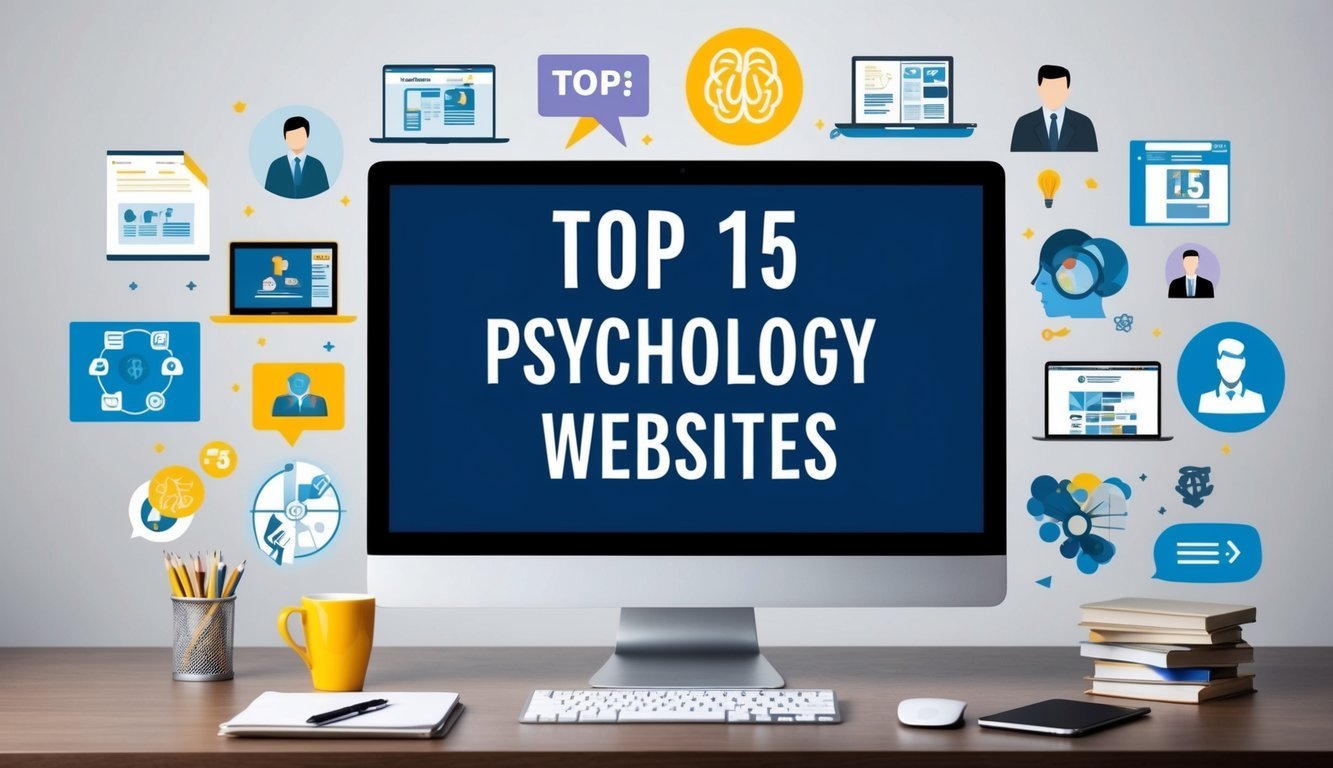PsychNewsDaily Publishers
100 Summit Drive
Burlington, MA, 01803
Telephone: (320) 349-2484
PsychNewsDaily Publishers
100 Summit Drive
Burlington, MA, 01803
Telephone: (320) 349-2484
Reliable psychology resources enhance understanding of mental health, offering insights on disorders, treatment options, and the importance of learning and development through interactive digital tools.

Finding reliable information on psychology can be a challenge. Fortunately, many excellent websites provide valuable insights into mental health, research, and practical advice. The best psychology websites offer resources that can help anyone better understand psychological science and improve their mental well-being.

From reputable institutions like the American Psychological Association to platforms like Psychology Today, there are many options available. Whether you’re looking for articles, research updates, or therapy resources, these websites make it easier to access quality information.
The right websites can make a big difference in how people learn about psychology. With the top 15 selections, readers will discover useful tools and resources to enhance their knowledge and support their mental health journey.

Psychological science covers important aspects of mental health and the processes of learning and development. These areas help individuals understand behaviors, thoughts, and emotions.
Mental health is a vital part of overall well-being. It influences how people think, feel, and act.
These conditions can impact daily life, making it hard to work, study, or maintain relationships.
Research emphasizes the importance of early intervention and support.
Access to resources helps individuals manage their conditions, allowing them to lead healthier lives. Understanding mental health improves awareness and reduces stigma, encouraging people to seek help when needed.
Learning and development are essential in psychological science. These processes help individuals grow and adapt to their environments.
Theories from psychological research, like those by Piaget and Vygotsky, highlight how children learn through interaction and exploration.
Each stage presents unique challenges and opportunities. Strategies that support learning, like hands-on activities and social interaction, help enhance development. Focusing on these areas allows for effective educational practices that meet individual needs.

Digital tools have changed how people access information and learn about psychology. With various e-resources and online learning platforms, students and enthusiasts can easily find materials that fit their needs. They offer flexibility and accessibility that traditional methods often lack.
E-resources include eBooks, articles, and online journals. For example, McGraw Hill offers eBooks that provide 180 days access to essential psychology texts. Users can opt for textbook rental or loose-leaf purchases based on their preferences. Digital access ensures that students can read resources anytime and anywhere, thanks to apps like ReadAnywhere.
Furthermore, platforms like Connect Access enhance the learning experience. They allow users to engage with interactive content, quizzes, and multimedia learning tools. Such resources foster a deeper understanding of psychological concepts.
Online learning platforms are essential for students and professionals in psychology. They provide courses that cover various topics, making learning more accessible. Many platforms focus on inclusive access, allowing students to learn at their own pace.
Courses often incorporate diverse formats, from videos to interactive assignments. This variety keeps students engaged and enhances their understanding. Some platforms even offer eBook access as part of their courses, ensuring that essential texts are readily available.

Psychological health is vital for overall well-being. Understanding psychological disorders and their treatment can lead to better outcomes for those affected.
Psychological disorders affect many people and can vary widely. Some common conditions include:
Mental health disparities exist, meaning some groups may have less access to care. Factors such as race, gender, and economic status can affect diagnosis and treatment availability.
Effective treatment for psychological disorders often involves a combination of approaches. These may include:
Access to treatment can be limited for many due to financial and social barriers. Increasing resources for mental health support is essential for helping those affected by psychological disorders.

Understanding cognitive and social elements of behavior helps in grasping how individuals think, feel, and interact with others. These areas focus on memory, motivation, emotion, and how they influence social behavior.
Social behavior refers to how individuals relate and interact with each other. Factors such as personality and emotions play a strong role in these interactions.
Personality: Different personality traits influence how people respond in social settings. For instance, extroverted individuals may seek social interactions more than introverts.
Emotions: Emotions are key in forming connections. Positive emotions can enhance relationships, while negative emotions can create barriers.
Social Learning: People often learn behaviors by observing others. This can impact motivation as well. For example, seeing kindness in others may inspire someone to act kindly.
These elements form the basis of how individuals engage in society and influence their overall well-being.
Cognitive functioning includes processes such as memory, intelligence, and decision-making.
Memory: Memory is vital for learning and social interactions. Good memory helps individuals recall past experiences, which can inform future social behaviors.
Intelligence: Intelligence affects how individuals solve problems and navigate social situations. Higher intelligence often correlates with better social skills.
Motivation: Motivation drives cognitive processes. For instance, the desire to connect with others can enhance learning and improve memory retention.
These cognitive aspects significantly impact how individuals behave in social contexts and influence their emotional responses.

Psychology has many contributors who help expand our understanding of the field. These individuals range from researchers in universities to practitioners who apply psychological principles in real-world settings. Their work has a significant impact on both academic research and practical applications.
In the academic world, researchers play a crucial role in advancing psychological knowledge. Universities like the University of Miami are known for their dedication to research and education in psychology.
Associate professors at these institutions often lead studies that help uncover new insights. They focus on a variety of topics, from mental health disorders to cognitive processes. These researchers typically publish their findings in journals and present at conferences, which allows for knowledge sharing.
Many academic contributors collaborate across disciplines, integrating insights from fields like neuroscience and sociology. This integration enhances the quality and relevance of psychological research. Their work not only informs textbooks but also has real-life applications, improving mental health treatment and understanding human behavior.

This section provides answers to common questions about top psychology websites, study resources, and reliable access to research materials.
Some of the top psychology websites for students include the American Psychological Association (APA) and Psychology Today. These sites offer valuable articles, resources, and guidance for those studying psychology.
Websites like PsyPost and Verywell Mind provide free research materials and articles on various psychology topics. These sites focus on the latest studies and ensure that readers have access to current information.
The American Psychological Association (APA) is often regarded as the most reliable website by psychology professionals. It provides authoritative resources, guidelines, and updates on best practices in the field.
Some psychology journals offer free access to specific articles through platforms like PubMed Central. Additionally, directory sites like Directory of Open Access Journals (DOAJ) list journals that do not require subscriptions.
Psychology Today features a mix of articles written by professionals, providing insights and advice on mental health, relationships, and psychology trends. Unlike more academic websites, it caters to a general audience with practical information.
Khan Academy offers a highly interactive learning experience for psychology. The platform provides engaging videos and practice exercises. This makes it a great tool for students who want to deepen their understanding of psychological concepts.